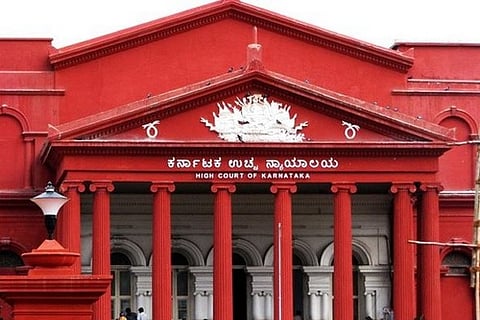

Bengaluru
A bench of the three judges, comprising Chief Justice Ritu Raj Awasthi, Justice Krishna S Dixit and Justice JM Khazi, was hearing various petitions challenging the ban on hijab in educational institutes in the state on Tuesday.
Senior Advocate Devadatt Kamat submitted that India's Constitution follows positive secularism, not like Turkish secularism, which is negative secularism. He said that our secularism ensures that everyone's religious rights are preserved.
Urging the Court to allow the Muslim women to wear hijab in educational institutes, Advocate Kamat also referred to a judgment of a South African court where the issue was whether a Hindu girl with roots in South India could wear a nose ring in school. He quoted the judgment which said that this case is not about uniforms, but exemptions to existing uniforms.
Senior Advocate Devadatt Kamat also submitted that South Africa's judgment also said that if there are other learners who hitherto were afraid to express their religions or cultures and who will now be encouraged to do so, that is something to be celebrated, not feared.
Advocate Kamat quoted the South African court judgment which said that "the display of religion and culture in public is not a 'parade of horribles' but a pageant of diversity which will enrich our schools and in turn our country."
He also referred to Canadian Court's judgment relating to a Sikh student seeking to wear Kirpan.
During the argument, Advocate Kamat also questioned government order and said that public order as per Constitution in Kannada is Saarvajanika Suvvyavasthe, which cannot have a different meaning.
He also said that the essence of Article 25 is that it protects the practice of faith but not a mere display of religious identity or jingoism.
The Karnataka High Court will continue hearing on Wednesday various petitions challenging the ban on headscarves in educational institutes.
The Hijab protests in Karnataka began in January this year when some students of Government Girls PU college in the Udupi district of the state alleged that they had been barred from attending classes. During the protests, some students claimed they were denied entry into the college for wearing hijab.
Following this incident, students of different colleges arrived at Shanteshwar Education Trust in Vijayapura wearing saffron stoles. The situation was the same in several colleges in the Udupi district.
The pre-University education board had released a circular stating that students can wear only the uniform approved by the school administration and no other religious practices will be allowed in colleges.
Visit news.dtnext.in to explore our interactive epaper!
Download the DT Next app for more exciting features!
Click here for iOS
Click here for Android